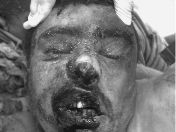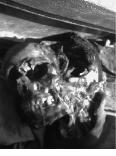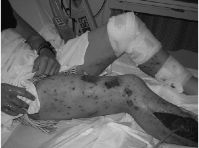Winter Soldier (29 page)
Authors: Iraq Veterans Against the War,Aaron Glantz
Tags: #QuarkXPress, #ebook, #epub

The coagulated blood from the man in this photo slinged off his body, off his face onto my shoe. That was the most repulsed I had ever been. There were flies landing on the corpses. They would land on my lips, they would land on my eyes, and they would crawl into my nose. I felt so violated by having been put through this.

I’m reminded of these images when I play video games or walk into a movie. When people ask me, “Hey man, you want to go see Saw IV or whatever?” I tell them no, because this is what I see when I watch those movies. This is somebody’s brother, this is somebody’s husband, this is somebody’s son, and this is somebody’s cousin. The only reason that we’re desensitized to it is because they’re not white, they’re not American soldiers.
That right there: I specifically asked my command, I said, “This man is missing his face, there is no skin left on his head.” And they said, “Take the picture anyway.” Not to identify him. Whoever was on the other end of the radio just wanted to see the picture, and now because of that person I’m left with that image.

I’d like to read an achievement off of my Army Commendation Medal that I received for my service in Iraq. “While on patrol…in Sadr City, the platoon was called upon to reinforce Iraqi Army battalion in Sector 48. PFC Goldsmith’s initiative and timely placement of his weapon system at a key intersection helped…the Iraqi Army battalion…destroy enemy insurgents…without any insurgents escaping the objective.”
I’d like to tell you exactly what happened that day. What you heard is true, but what they left out was that I was standing in a Humvee with my platoon sergeant. My platoon sergeant claimed he saw an insurgent and fired upon that man. Because the highest-ranking enlisted man in my platoon fired his weapon, I knew that it was “game on” and I could get away with anything. There was a little boy on top of a building, and he was holding a stick pretending to have an AK-47. He pointed it at me pretending to shoot. I trained my weapon on him and thought, “I hate these Iraqis. I hate these kids who throw rocks and bricks at me. This is my chance; I can kill this kid.” Just to take one out of the couple million of ’em out.” It took a lot of thinking not to pull the trigger that day. I could have killed a six-year-old boy, someone’s son, but I didn’t.
When I came home from Iraq all I did was drink. I’m a severe alcoholic and so was just about everybody who lived in the barracks with me. We used to go out every Friday and Saturday night and I would just about finish a 1.75 liter bottle of vodka. I blacked out every time. That was my goal, I wanted to black out. I was self-medicating because we were told that if we sought mental health, we would be locked away and our careers would not advance.
The only thing I looked forward to was getting out of the military and going to college. That hope was taken away from me on January 10, 2007, when George Bush gave his State of the Union address announcing that he was going to send an additional twenty to thirty thousand troops into the sandbox. My unit was one of the five to be locked down with stop-loss. No one could leave—even by reenlisting to go somewhere else to avoid the deployment. People set to retire in two months were locked into an eighteen-month deployment under some of the worst conditions since the initial invasion.
When I found out that I was stop-lossed I went into the sharpest, most anguishing downward spiral that I could imagine. I went into the hospital complaining of chest pain and they had me see a mental health professional. They diagnosed me with depression, anxiety disorder, and adjustment disorder. I was obviously a broken soldier and I was still set to deploy in May 2007, the same week I supposed to get out of the army.
The day before I was set to deploy was Memorial Day. I went out onto a field in Fort Stewart where there’s a tree planted for every soldier in the 3rd Infantry Division who’s died. I went out among those fallen soldiers and I tried to take my own life. I took pills and my regular poison of vodka and drank until I couldn’t drink anymore. The next thing I knew I was handcuffed to a gurney in the hospital. The cops had found me, dragged my body into an ambulance, and locked me up. I spent a week on a mental ward.
After trying to kill myself I was locked up and analyzed and saw doctors, and when I got out of the mental ward I was told that I was going to be removed from the military in a quick, comfortable way. Within two weeks I could be home. The doctors said that I had a severe problem and they recommended removal from service. I was ecstatic. It was great.
Instead, they tried to prosecute me for malingering. My commander, Captain Eric Melloh, who was deployed, decided that I should be removed from the company. I should have my sergeant stripes removed, take money from me, and possibly put me in jail. I went to the military lawyers on Fort Stewart and asked them to help me help fight this Article 15 nonjudicial punishment, and they said, “No, you need to give up this fight. Because people try to fight it and all it does is bring down the military and blah, blah, blah.” I was refused help by the attorneys because they were officers and they didn’t want to bring down their own career by supporting me.
I was eventually removed from the military on one of the happiest days of my life, August 16, 2007, on a general discharge. My DD 214, the paperwork, which states every accomplishment of my military service, says in nice big bold letters, “MISCONDUCT, (SERIOUS OFFENSE).” I committed a serious offense by trying to kill myself because I was so damaged by the occupation in Iraq. It was misconduct for me not to deploy while I was handcuffed to a bed in the hospital. So I lost my college benefits, the one thing that really gave me hope. I didn’t know where, I didn’t know what I was gonna study, but I knew I was going to college in September of ’07. That didn’t happen. Now I can’t pay for it.
My money is disappearing. Between VA visits and personal instability, I’ve found it extremely hard to find a job. To tell you the truth, I haven’t really looked cause I’m having a rough time. So I deliver pizzas on Wednesdays. That’s what I am now, a pizza delivery boy. I was a sergeant, I was a leader, I was a trainer, and I was very well thought of. I was a very good soldier. Now I’m a pizza delivery boy who works once a week because that’s the only job where I can call in a couple hours before and say, “I’m still at the VA, I’m waiting in line. I’m sorry I can’t come in for a couple hours.” That is what stop-loss does.

This man who has to remain nameless is a friend of mine I traveled to North Carolina to see on my way home.
What happened was he stepped on a pressure plate, an antipersonnel mine, and he almost lost his right leg. He had arterial bleeding in his right arm, his left leg, his right leg. He lost all his hearing, ear drum is destroyed in his right ear. This man was supposed to get out of the army the same week that I was, the same week that our unit deployed. So I’m faced forever with “that could have been me” or “if I were there maybe things could have been different.” This is someone who was in my platoon, who I served with for a year. When I came into the hospital and I was feeling guilty about trying to kill myself, what this man said to me as soon as I walked into the room was not “Hey how ya doing?” Not “Dude you’re a bad person for not coming over there with us.” He looked at me with an intense look in his eyes and he said, “Dude you’re not going over there right?” And that, that filled my heart with something that no one else could have done.

Lance Corporal, United States Marine Corps, Assault Man
Deployments: March–September 2005, USS Ponce
Hometown: Madison Heights, Michigan
Age at Winter Soldier: 22 years old
Two years ago I would not have believed you if you told me that I’d be standing in D.C. protesting the war. I was very strongly supportive of the war in 2003. I even wore desert cammies in my school photo.
I graduated from high school in 2003. I enlisted in the Marine Corps and went to boot camp that November. After graduating from boot camp and the school of infantry, I felt poorly prepared for battle. Most of the training I received was World War I–style fighting where you’re charging across an open field shooting at targets in bunkers with no civilians. Other common training includes patrolling through a two-dimensional forest, firing blanks, or pointing your weapon at other marines with their shirts turned inside out saying, “bang-bang.” For most marines that’s considered normal training.
Upon arriving at my permanent-duty station, I was attached to the rifle platoon in my company. I then received an extensive urban training, learning how to fast rope out of helicopters, storm buildings, clear rooms, and do legitimate urban fighting.
In this whole eight or nine months of training not once did anyone attempt to teach me to speak Arabic, and I believe our total training as far as dealing with civilians, cultural sensitivity, was about four or five hours at the base theater, receiving speeches on the conduct of war along with other things that no one really paid attention to and we weren’t expected to really take to heart and memorize.
As I said, at the beginning of the war I was very pro-war, but events gradually eroded my faith in the military. It started when I was listening to stories from Iraq War veterans. I started to question whether our mission was as clear-cut as the administration had made it seem.
I also noticed incompetence in high places. Throughout our deployment a lot of machine guns and personal rocket launchers were broken or misfired frequently because they were very old. We’d made it as far as Kuwait when an officer noticed that the front sight had broken off one of the Shoulder-Launched Multipurpose Assault Weapons. He was furious and demanded we all sign statements explaining who had it when it broke and why it broke. We had to explain, “Sir, it’s been broken for the past year. You didn’t notice it during pre-deployment inspection because you were concerned that not everyone had sewn name tapes onto their backpacks and flak jackets.”
My personal first aid kit was used during a training mission and I was promised it would be replaced before we deployed. It wasn’t. I was issued a nine-hundred-dollar rifle scope without the proper Allen wrench to attach it to the handle of my M-16 so it kept falling off. In its place I used a three-hundred-dollar holographic sight that I purchased with my own money. I’ve loaned that to another marine who’s deploying to Iraq in four days.
